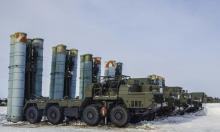Presidents of Ukraine, Georgia call for peaceful resolution of Kyrgyz crisis
The presidents of Ukraine and Georgia, who came to power after mass protests like those that drove out Kyrgyzstan's leader this week, expressed hopes on Friday for a peaceful resolution of the tensions in that ex-Soviet state.
Unlike the 2003 "Rose Revolution" in Georgia and last year's Ukrainian "Orange Revolution," Kyrgyzstan's uprising was accompanied by violence and by widespread looting in the capital, Bishkek.
Ukrainian President Viktor Yushchenko and his Georgian counterpart, Mikhail Saakashvili, met to discuss expanding cooperation between their countries, but the dramatic events in Kyrgyzstan dominated their discussions.
After the talks, Yushchenko said that the people of Kyrgyzstan should pursue a "peaceful settlement" of the crisis that shook the Central Asian country. "A peaceful settlement is the best way for crossing all the t's," Yushchenko said.
"Our position is one of solidarity with the people fighting for freedom and democracy for their nation," he said.
Kyrgyzstan became the third former Soviet republic over the past 18 months _ after Georgia and Ukraine _ to see popular protests bring down long-entrenched leaders widely accused of corruption.
Saakashvili said that Ukraine and Georgia are not the "exporters of the revolutions" and stressed that the peaceful popular movements in Georgia and Ukraine demonstrated a good example for settling such a conflict.
The Georgian leader dismissed speculations about similarities between Akayev's ouster and the revolutions in Ukraine and Georgia _ which all followed disputed elections.
"Our revolutions were similar not because somebody fabricated them, but because people react to injustice in the same way in all countries," he said.
Yushchenko and Saakashvili said they also discussed boosting bilateral ties and likely revamping of the GUUAM group, an alliance of five former Soviet republics, Georgia, Ukraine, Uzbekistan, Azerbaijan and Moldova. The group was established in 1997 aimed at enhancing regional stability and encouraging economic development outside of Moscow's orbit.
The move would likely anger Russia which is increasingly losing grip over its former satellites.
"We are sure about GUUAM as an idea and a project of regional cooperation ... this project is not (aimed) against anyone," Yushchenko said.
In another move that could further alienate Ukraine from Russia, its huge neighbor and key energy supplier, Yushchenko said that his government will participate in the Commonwealth of Independent States, a Russia-dominated loose grouping of former Soviet republics, on the basis of practicality.
"We will support rational relations but we don't have time to spend on mirage-like projects we are not interested in," he said.
NATASHA LISOVA Associated Press
Subscribe to Pravda.Ru Telegram channel, Facebook, RSS!





